Where We Work
See our interactive map

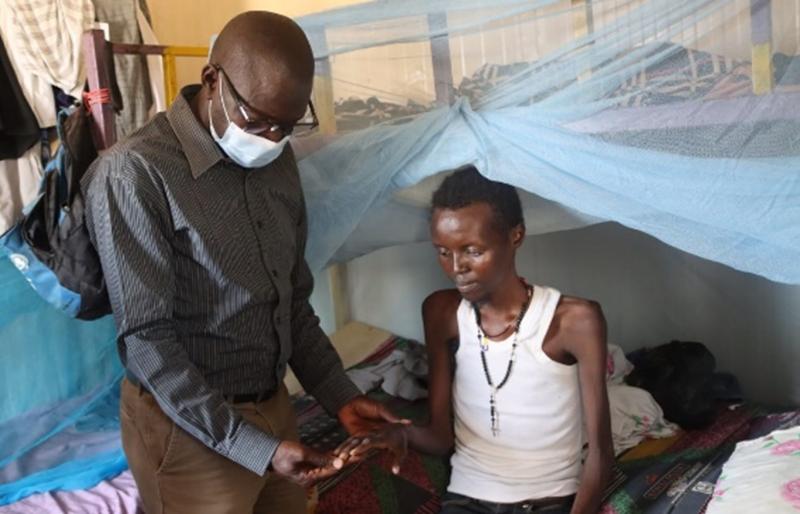
Galla Moses, a physician and deputy chief of party for the USAID Advancing HIV & AIDS Epidemic Control activity, cares for a client in South Sudan. Severe weather, from droughts to floods, makes it hard for health workers to reach everyone who needs services. Photo by Gladys Achan for IntraHealth International.
At the UN General Assembly, South Sudan’s Minister of Health had a clear ask for world leaders: increase investment in health workforce development in vulnerable climate regions like hers, as well as here in the US. Just days later, Hurricane Helene unexpectedly wrecked Western parts of North Carolina–the state I call home.
"We are at the grasps of the new health challenges driven by climate change," says Hon. Minister Yolanda Awel Deng during the UN General Assembly. Watch her full remarks.
“South Sudan, like many other nations, is already experiencing the realities of climate change,” says Hon. Minister Yolanda Awel Deng, the country’s minister of health. She spoke during the recent UN General Assembly (UNGA), one of the largest annual gatherings of global leaders.
Hon. Deng says rising temperatures, prolonged droughts, and unpredictable flooding have intensified South Sudan’s health challenges. Seven out of ten states are experiencing their worst flooding in 150 years, while two other states have had extreme drought for five years.
“Seven million people in my country are on the verge of starvation,” Hon. Deng says. “Malnutrition, cholera, and malaria outbreaks are more frequent. At the heart of our response to this crisis is our health workforce.”
“At the heart of our response to this crisis is our health workforce.”
Health workers, however, are in way too short supply. South Sudan is one of 37 African countries on the World Health Organization (WHO)’s list of 55 countries facing the most pressing health workforce needs for reaching universal health coverage (UHC).
Hon. Deng notes that 56% of South Sudanese do not have access to health care, and climate-induced migration and displacement are intensifying challenges.
“So you can see what the frontline health workers are going through. They must be adaptable, they must be flexible, and they need resources,” says the Hon. Minister.
IntraHealth International, where I work, agrees. We host the secretariat for the Frontline Health Workers Coalition, and cohosted the UNGA event Hon. Deng spoke at. The Coalition is urging global leaders and donors to make long-term investments to support health workers now, not after climate change, conflict, or another pandemic further intensify global health challenges.
IntraHealth has worked in South Sudan for nearly 20 years, side by side with the Ministry of Health. We’re currently implementing the USAID Advancing HIV & AIDS Epidemic Control (AHEC) activity and strengthening the skills of health workers and local leaders to provide comprehensive HIV/AIDS services. My colleagues see first hand how recent flooding, as well as violence, has made it harder to reach key and priority populations with HIV prevention, care, treatment, and viral suppression services.
“Space is an issue. Power is an issue. Access to clean water is an issue.”
Samson Radeny, IntraHealth’s East and Southern Africa regional director, recently visited health facilities and key population hotpots where AHEC delivers services. He points out some of the challenges our staff and health workers we partner with face: “There are just so many clients seeking services, very few health workers to attend to them, and hence very long queues. Space is an issue. Power is an issue. Access to clean water is an issue. The high mobility of the population affects health workers' ability to deliver services consistently and retain HIV clients in care. They’re working in a very difficult and complex environment.”
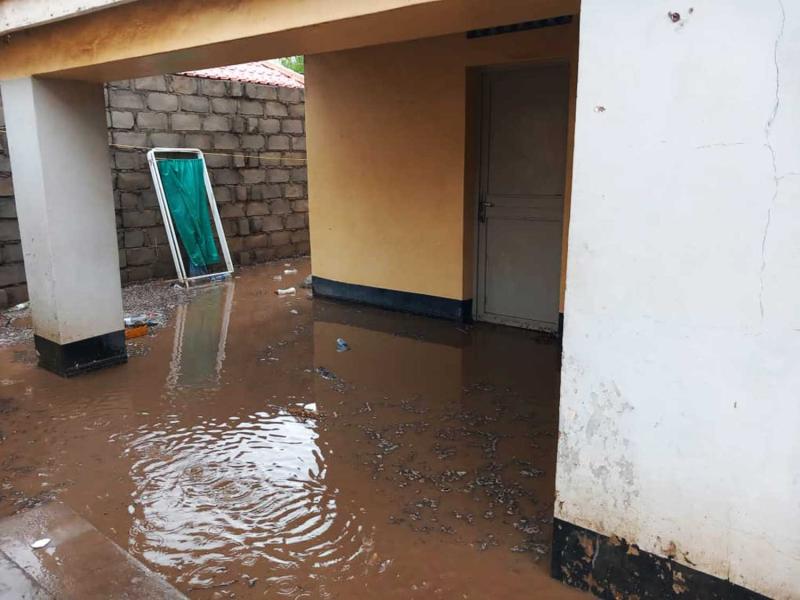
Recent downpours in South Sudan flooded Munuki Primary Health Care Center, one of the facilities IntraHealth supports through the USAID Advancing HIV & AIDS Epidemic Control activity. Photo courtesy of Anne Kinuthia.
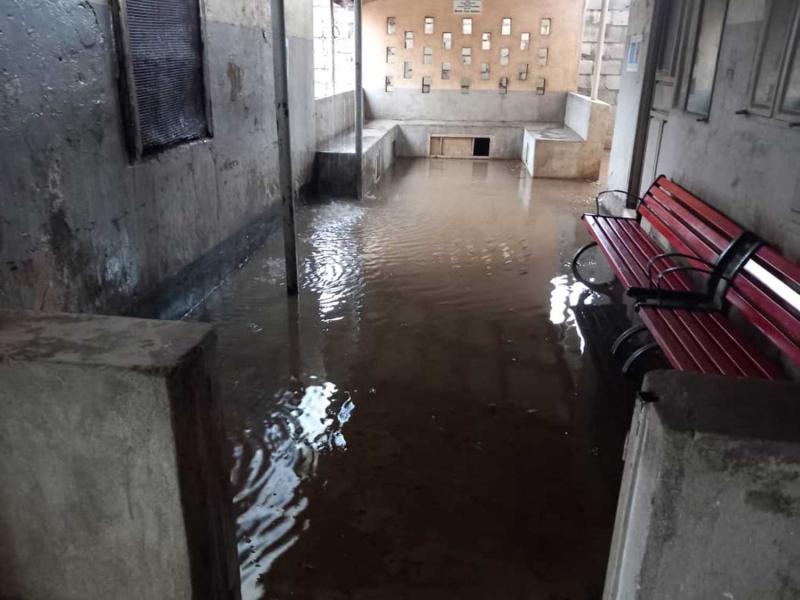
Recent downpours in South Sudan flooded Munuki Primary Health Care Center, one of the facilities IntraHealth supports through the USAID Advancing HIV & AIDS Epidemic Control activity. Photo courtesy of Anne Kinuthia.
“For every problem we’re trying to solve, health workers are the front line of response,” says Vanessa Kerry, CEO of Seed Global Health and Special Climate and Health Envoy for the WHO. Kerry, a longtime spokesperson for the Frontline Health Workers Coalition, raises awareness of the links between climate change and health impacts, including during UNGA.
“Climate change is accelerating existing problems we’ve failed to solve,” says Kerry, “And one of those is that we have always undervalued, underinvested in, and under-supported health workers.”
“We have always undervalued, underinvested in, and under-supported health workers.”
The WHO warns we’re facing a global shortage of ten million health workers by 2030, and half of that shortage will be in sub-Saharan Africa, which also has the greatest disease burden. Kerry points out that the hardest hit countries, like South Sudan, are the most vulnerable to the health impacts of climate change, despite contributing the least to the problem and having the fewest resources to deal with it.
“There is enough money in this world to solve the pressing problems,” Kerry says. “We're talking about choices being made and not made. I think we have to start talking about the return on investment in health workers.”
A report by the Frontline Health Workers Coalition shows the primary health care workforce offers up to a 10:1 return on investment, with community health workers (CHWs) especially offering high financial and social returns, preventing deaths, and contributing to economic growth.
Kerry says governments and donors need to understand this, for allocating domestic budgets and all types of global aid and development monies: “There’s lots of Climate funding out there, hundreds of billions, but not a lot of it's going into health. The workforce is the number one adaptation, resilience investment we can make for climate change and health.”
The weekend after Hon. Deng and Kerry spoke at UNGA, Hurricane Helene hit Western North Carolina, an area a few hours from where I live and where IntraHealth was founded. Scientists say warming sea temperatures amplified Hurricane Helene and increased its winds and rainfall.
“Helene dumped 42 trillion gallons of water into the mountain hollers of Western North Carolina,” says Kody Kinsley, Secretary of the North Carolina Department of Health and Human Services. He spoke during the North Carolina Global Health Alliance Conference in October. “I’ve never seen anything like it—whole communities completely wiped off the map.”
“Helene dumped 42 trillion gallons of water into the mountain hollers of Western North Carolina.”
Asheville, one of the hardest hit towns, was once considered a “climate haven” and safe from severe impacts of global warming. But even here hospitals lost power and water, while their emergency rooms overflowed with patients.
North Carolina also has a shortage of health workers, including up to 21,000 nurses. “We need a workforce that is present in these communities,” says Secretary Kinsley. “And that comes back to health care financing.”
Kinsley says health care was already out of reach for many people in remote areas across the state, including “the hollers” (small river valleys). “We’ve had ten hospitals close in rural North Carolina in the last decade,” he says. “We’ve had a flight of providers leaving rural communities. Forty-three counties don’t have a psychiatrist.”
“We’ve had a flight of providers leaving rural communities."
One of his biggest regrets coming out of COVID-19 is that there was not a broader government investment in sustained public health care infrastructure. “We had considerable sums of money during COVID-19 to invest in building a health care infrastructure that we should have all the time. Then they turned off the tap. It would have been a whole lot cheaper to sustain it and have it ready for everything else, and put people in a place of wellness.”
As part of its COVID-19 response and recovery, North Carolina engaged and paid CHWs. “They were on the ground and connecting people to care, and they were oh so amazingly effective," Kinsley says. "Now we’ve lost a lot of funding.”
Kinsley recently received approval from the federal government to again engage CHWs, this time for a crisis counseling program. “We’ll have about 100 [CHWs] with a behavioral health bent going door-to-door connecting people to care," he says. "The challenges are how to sustain this workforce, how to help people see the value, how to get tied into payment systems so it’s part of doing care and we can show the lower costs over time.”
“We live in a time of multiple crises,” says Tina Flores, director of the Frontline Health Workers Coalition. “Health workers around the world are stretched to the limit. We saw this so keenly during the height of COVID. People in my home of New York City would make some noise every evening at 7 pm, in praise of the health workforce. Where is all of that energy and love now?”
At the UNGA event, Flores announced the year-long “Health Workers Save Lives Campaign,” led by the Coalition and Seed Global Health to highlight the importance of health workers and ask for increased funding and better policies for health workers to address all our health challenges, including climate change.
“We have to advocate for a full, fit-for-purpose health workforce.”
Vanessa Kerry, who instigated the campaign, stresses we need to focus on more than the shortage of health workers, including ensuring the necessary skills mix to match communities’ needs. “We have to advocate for a full, fit-for-purpose health workforce. We need community health workers, but if we do not have a solid referral chain for community health workers to refer to, the system falls apart.”
Her goals for the new campaign? “I would like to see our multilateral funders and development banks make more flexible funding and get behind country-led plans prioritizing the primary care health workforce.”
The Coalition invites all advocates and interested organizations to join the campaign. A free playbook is available for you to use to advocate to decision-makers at the global, country, state, and local level.
“Health care workers are the blood line, the lifeline, of our health care system,” says Hon. Minister Deng. The government of South Sudan, with support of international partners, is investing in community-based health workers. But more needs to happen, she says.
Hon. Deng calls on partners and donors to strengthen the health workforce to address climate change in three ways:
"Climate change knows no borders. The health consequences will affect all nations."
Deng’s asks are in line with the #HealthWorkersSaveLives campaign, and highly relevant for decision-makers participating in COP 29, the United Nations Climate Change Conference, happening this week. Kerry, again advocating for health workers, says it well: “As leaders gather for COP29, we urge them to fast-track a just transition and increase funding for health systems and frontline health workers to protect the most vulnerable."
Climate change might affect your state, your hometown next. I urge you to join IntraHealth’s and the Frontline Health Worker Coalition’s advocacy, starting now during COP 29. We’ll push for more focus on health in climate change discussions and funding, and we’ll keep pushing the US, and multilateral funders, to maintain and hopefully increase support for health workers.
Global health challenges call for new and extraordinary partnerships. IntraHealth is a founding member of the Frontline Health Workers Coalition and the North Carolina Global Health Alliance. Through our recent combination with Global Communities, we are integrating our health programming more deeply across the humanitarian and sustainable development sectors to address intersecting health challenges, such as pandemics and epidemics, infectious and noncommunicable diseases, and the consequences of rapid urbanization and climate change.
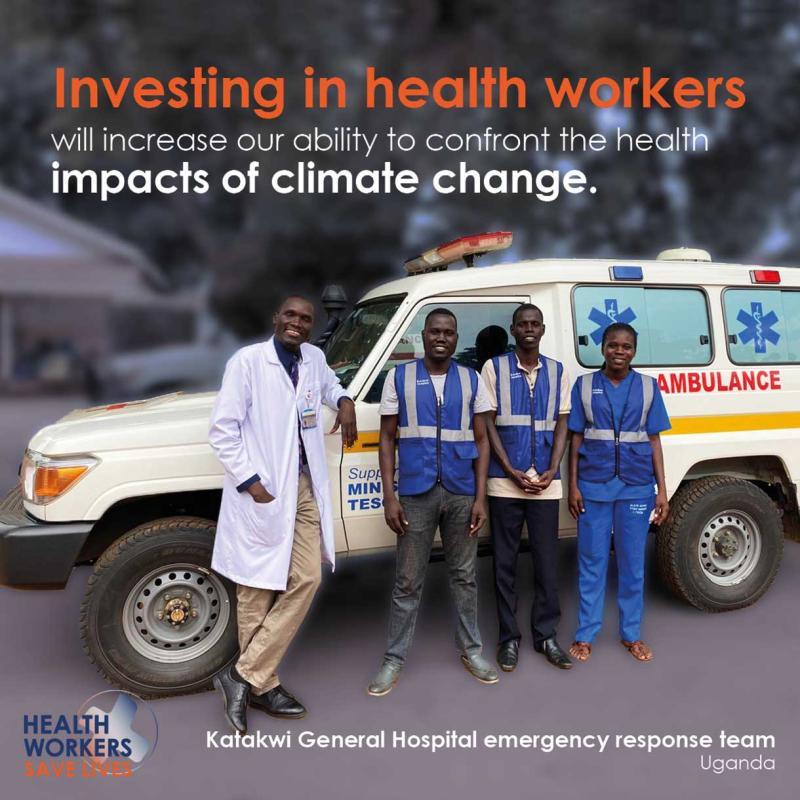
Advocate for investment in health workers by sharing #HealthWorkersSaveLives campaign graphics.
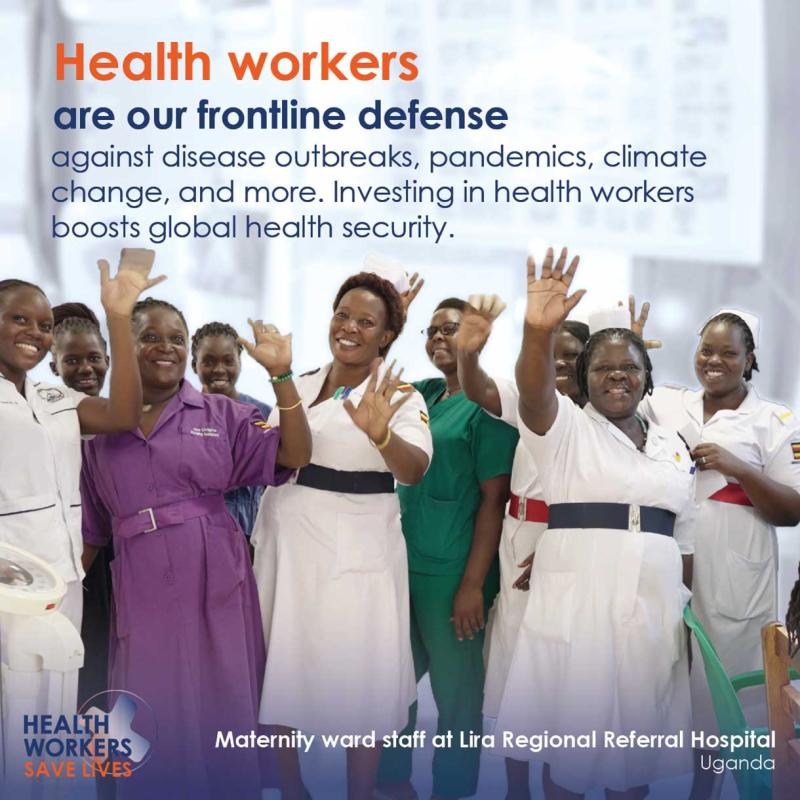
Advocate for investment in health workers by sharing #HealthWorkersSaveLives campaign graphics.
Get the latest updates from the blog and eNews




